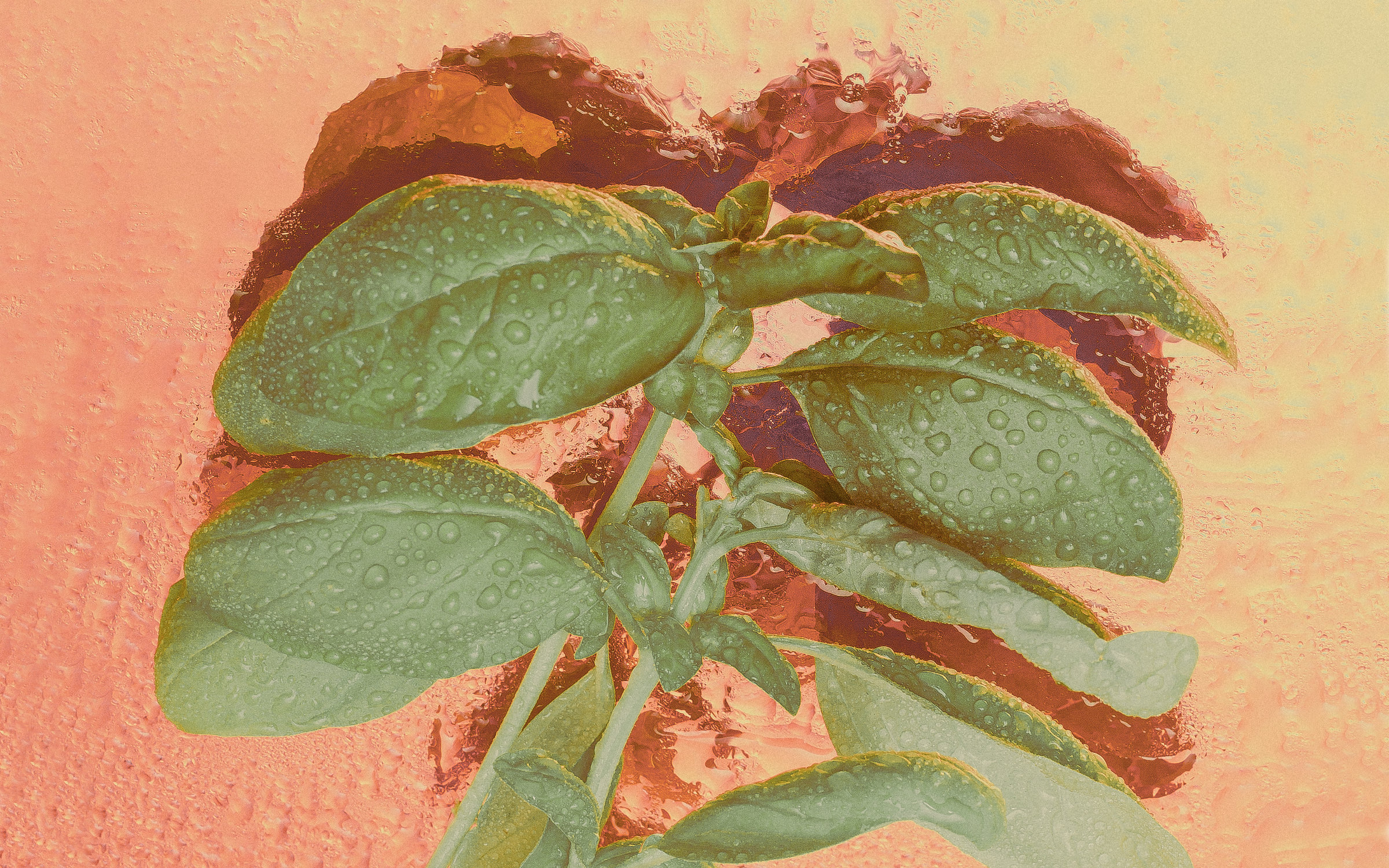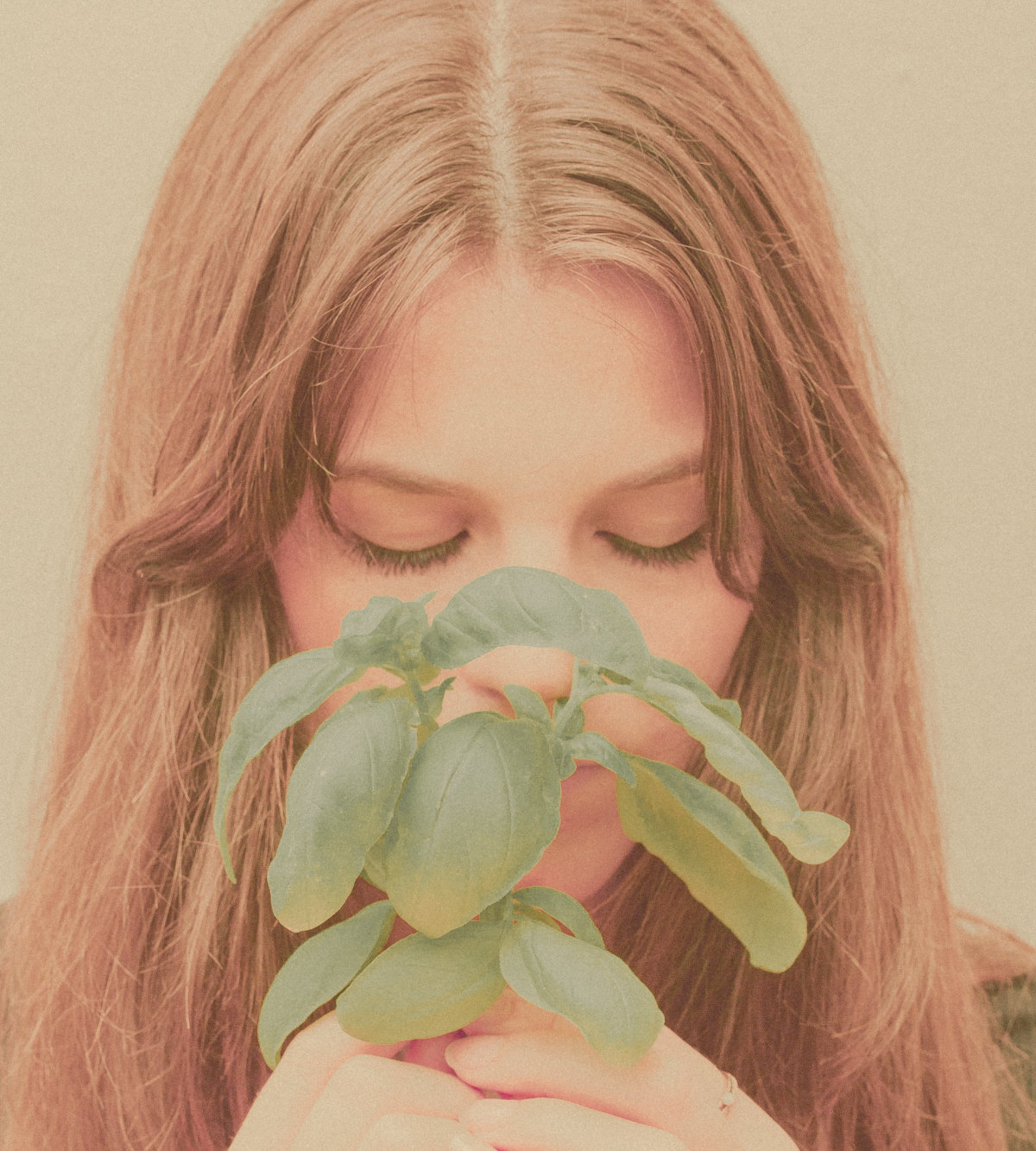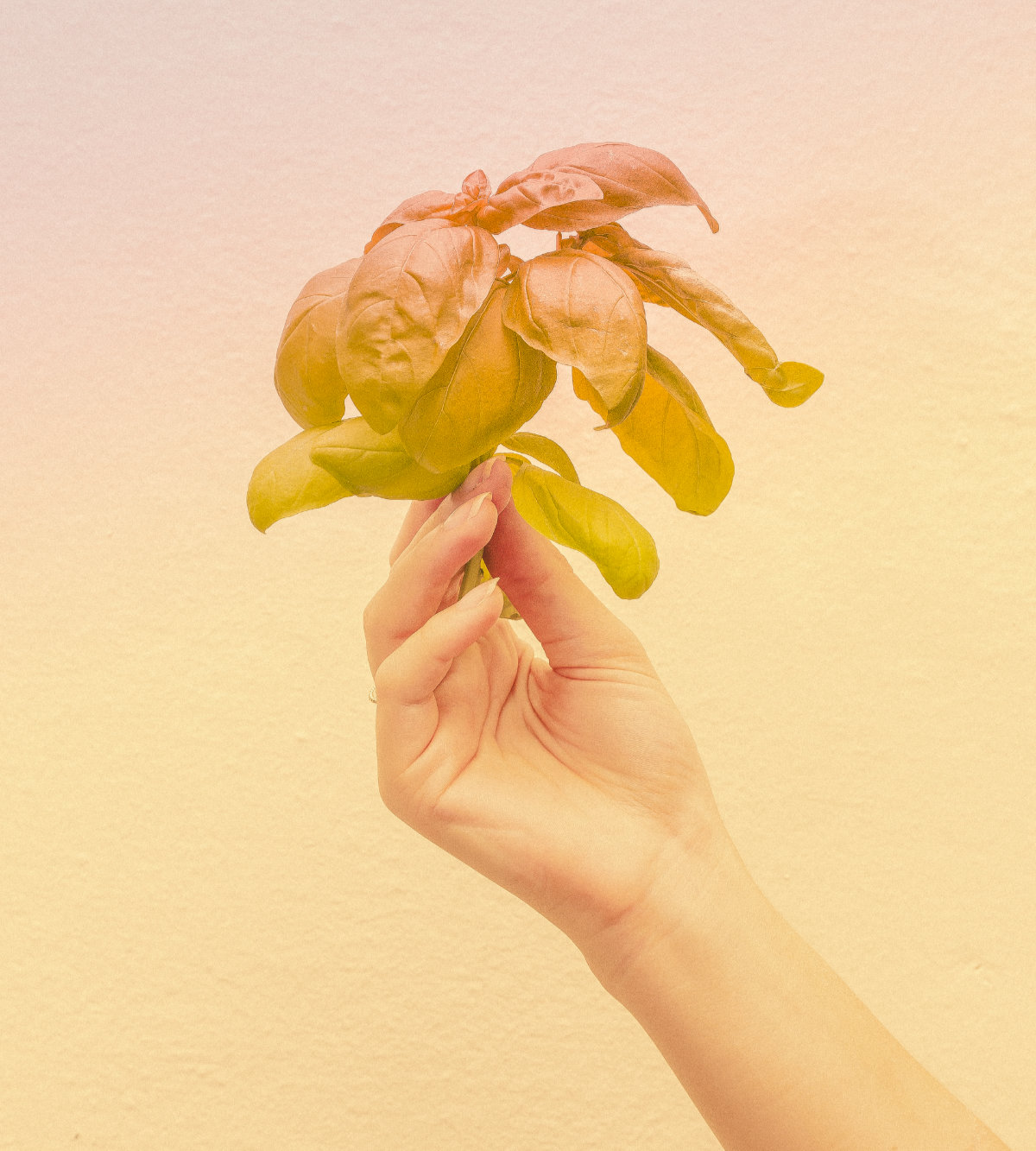The New Gastronome
Fred & I
Highly Sensitive Explorations
by Constanze Weiss
by Constanze Weiss

Fred was staring at me, unblinking and patient. I was staring right back at him, unsure of what to do next. For weeks, I had tended to him, had watered him, adjusted his spot on my balcony so he would always find himself in a warm but not too sunny environment – such had been the handwritten instruction on the little packet of seeds I had received as a birthday present. “Compatto (but you can call me Fred)”, my friend had titled his note. It was a basil variety that did well in his region in the south of Italy and would, one day, produce medium to large spoon-shaped leaves with a more floral and balsamic aroma than other types of basilico.
I had been ecstatic about the thoughtful gift and the chance to finally grow a seedling – a plant – of my own, something I had always wanted to do but never quite taken the final step towards. There was, after all, responsibility attached to growing your own herbs, fruits or vegetables, and I had a pesky tendency to overthink these kinds of things into obliteration instead of simply trying them. Had I found the courage to try before Fred, maybe I would have been better prepared for what that little plant would soon come to mean to me …

When pressed to describe myself in a couple of words, for years, I would choose the same ones: kind, caring, compassionate, emotional, sensitive. The ‘too’ in front of all these adjectives remained silent, poisoning the air from where it hung yet making its way into other people’s minds regardless. It wasn’t that I considered these characteristics to be bad in any way, my entire life, it had just seemed that I possessed them to a greater degree than most other people. They, too, would be quick to identify themselves as kind and caring, compassionate, emotional, or sensitive, but their experience of what all those qualities entailed somehow never seemed to match up with what I was feeling on a daily basis. Soon, those very same people would tell me to ‘get over myself’ or advised me to ‘not make my life harder than it was’. They couldn’t understand why the feelings I had for certain people and situations could haunt me months – if not years – into the future and showed little patience on the abundant occasions when I simply ran out of energy before or during an evening out, sooner or later replacing me with people that were more fun to be around. It was moments like these that shouted the ‘too’ back at me so loudly that, over time, my beautiful characteristics became tainted, even for me.
“It is both a blessing and a curse to feel everything so very deeply” – David Jones
Instead of feeling proud of the level of kindness and compassion, I tended to meet others with; instead of embracing my emotions and sensitivity for the gifts they were, I just felt weird and misunderstood. Later, I would find others who described their experience as feeling flawed, convinced they had to hide and were doomed to a second-rate life (Aron, 1999). For, feeling misunderstood by others, as heart-breaking as it can be, is made all the worse when you can’t even quite understand yourself. Why did I care so much about everything, always putting other people’s feelings and needs above my own? How was it possible that short social interactions could lead to a level of exhaustion that became physically palpable if not tended to immediately and in the right way? What was wrong with me that I couldn’t bear to educate myself on the happenings around the world without needing a multi-day break to recuperate from the horrible acts of violence I encountered in the news1? When would the daily grind of noisy office life start to fade into the background as it seemed to do for other people instead of rendering me unable to think, let alone concentrate? And why could I feel perfectly content walking into a room only to soak up another person’s anxiety, anger, or sadness within seconds of arriving?

Without the answers to any of these questions, it was easy to fall into the habit of thinking that something simply had to be deeply and irreversibly wrong with me – nothing to be done about it. Or was there? Though I can’t remember when I first came across the term Highly Sensitive Person (HSP), I do know that the descriptions resonated with me immediately. I found myself on the page, perfectly captured and better understood by people I had never met than by those I shared my daily life with: “If you’ve often been told that you feel things ‘too’ deeply, are ‘too’ sensitive, or that you ‘feel too much’, you’re likely a highly sensitive person (Highly Sensitive Refuge, 2021)”, the article described. It went on to explain that to be highly sensitive meant to experience physical, mental, or emotional responses to stimuli – external ones like situations and people but also internal ones like thoughts and emotions – to an oftentimes overwhelming degree, incomprehensible to other people. At the same time, it was perfectly normal. This high degree of Sensory Processing Sensitivity (SPS) was mostly hereditary, and a number of studies had concluded that about fifteen to twenty per cent of the world population had the gene (Highly Sensitive Refuge, 2021). So, I was not alone with it after all.
A. D V. E. R. T. I. S. I. N. G
It wasn’t all bad, either. While being an HSP naturally comes with exclusion, feeling overwhelmed and exhausted, it is also often associated with being very creative and empathetic, intuitive, conscientious, and able to learn without being aware that you have learnt. Even something as small as being “better at spotting errors” and “especially good at tasks requiring vigilance, accuracy, speed, and the detection of minor differences” (Aron, 1999) is often attributed to being an HSP. But what does it really mean? Dr Elaine Aron summarized the four main HSP traits in the acronym D.O.E.S. (Highly Sensitive Refuge, 2021):
Depth of Processing – HSPs tend to process information more deeply than most. This is seen as their fundamental trait, responsible for their good memory and artistic creativity but often leading to a feeling of ‘burn out’.
Overstimulation – HSPs take in things other people don’t even notice. They perform more cognitive work than the average person, often leaving them exhausted in situations where others feel fine.
Empathy (or Emotional Reactivity) – HSPs react stronger to positive and negative emotions within themselves while also being aware of how other people feel, often resulting in them being empathetic and helpful.
Sensitivity to Subtleties – HSPs often pick up on tiny details like sounds, smells, or details, as their nervous system is wired to process every sense impression deeply. This can feel very distracting, often making it hard to concentrate.
“If you’ve often been told that you feel things ‘too’ deeply, are ‘too’ sensitive, or that you ‘feel too much’, you’re likely a Highly Sensitive Person.”
Though I hadn’t seen it described as such, to me, it also seemed to have a lot to do with energy. That is, the energy exchanged between people through various channels and situations. HSPs pick up on the energy of others, causing them, in turn, to run out of their own at a quicker rate. Therefore, it is not surprising that they often crave alone-time in their designated sanctuaries or refuges, places, usually easily regulated in terms of sensory stimuli, they can retreat to in order to regain some of that energy. While this can look different from person to person, for me, it mostly takes one of two forms: a candle-lit room, set up for yoga or journaling, or the two square meters I lovingly call my balcony where Fred has been growing.

At first, I stuck to my friend’s instructions rigorously, checking up on my little seedling more often than I would like to admit. After a while, however, things started to feel more natural. I would get a better feeling for the soil and the cues it would give me if it wanted to be watered more, or less. I also started making my time with Fred a ritual, often taking a book and a cup of tea outside to spend time with him, rather than anxiously stalking his growth from my bedroom window. That way, I not only benefited from the almost meditative quality of trying to figure out what my little plant needed that day, I could also revel in his quiet company – so much more soothing and calming to me than most humans. Little by little, this time spent with Fred also started teaching me things about myself, for here I could be as kind, caring, compassionate, emotional, and sensitive as I wanted without ever being too much. Instead, it was these very qualities that allowed me to give my full attention to him, noticing the smallest of changes and adjusting his position or water intake accordingly. I fell in love with the process, and, more importantly, I allowed myself to re-fall in love with my personality traits as well, if even just a little bit.
Despite spending so much time with Fred, he still somehow caught me off guard this morning, sitting in his pot, fully grown. He must have had a growth spurt overnight, for there was no pretending anymore that he was still a seedling or needed some more time to grow. Instead, Fred was staring at me, bright green, happily stretching his leaves towards the morning sky, and I was staring right back at him, a little bit shocked, mostly happy and – who are we kidding? – with a little tear in the corner of my eye.
1 I acknowledge that it is an immense privilege to take a break from the cruelties and injustices that happen all over the world and that, even for HSPs, it should be the goal to find a healthy balance between staying informed and acting as an ally, without overexerting themselves. I’m working on it.
Bibliography
Aron, Elaine N. (1999). The Highly Sensitive Person. Thorsons.
The Highly Sensitive Refuge (2021). What is a Highly Sensitive Person? https://highlysensitiverefuge.com/what-is
highly-sensitive-person/ (accessed 23.08.2021)
Photos ©Aarón Gómez Figueroa
The opinions expressed in the articles of this magazine do not necessarily represent the views of
The New Gastronome and The University of Gastronomic Sciences of Pollenzo.